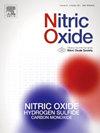Acute effects of l-arginine intake on heart rate variability after a submaximal exercise test in healthy men: randomized clinical trial
IF 3.2
2区 生物学
Q2 BIOCHEMISTRY & MOLECULAR BIOLOGY
引用次数: 0
Abstract
l-arginine (L-ARG) is a semi-essential amino acid and a precursor for nitric oxide (NO) synthesis via endothelial nitric oxide synthase (eNOS). While NO has been implicated in autonomic modulation and vascular function, the effects of acute L-ARG intake on heart rate variability (HRV) after exercise remain unclear. This study aimed to assess the acute effects of L-ARG supplementation on HRV and cardiovascular recovery following submaximal aerobic exercise in healthy men. In a triple-blind, randomized, placebo-controlled, crossover trial, 37 physically active males (18–30 years) underwent two treadmill exercise protocols: one following ingestion of 3 g of L-ARG and the other with placebo. HRV and cardiovascular parameters (heart rate, systolic and diastolic blood pressure) were measured at baseline and across 20 min of post-exercise recovery. Time- and frequency-domain HRV indices were analyzed using validated algorithms. Two-way repeated measures ANOVA and post-hoc tests were applied (p < 0.05). Significant time effects were observed for HRV and cardiovascular variables across both protocols (p < 0.001), indicating physiological recovery. However, no statistically significant differences were found between the L-ARG and placebo conditions for any HRV or hemodynamic outcome. A trend toward faster vagal reactivation (rMSSD) was observed with L-ARG, but effect sizes were small and not clinically relevant. Acute supplementation with 3 g of l-arginine did not significantly influence HRV or cardiovascular recovery following submaximal aerobic exercise in healthy young men. These findings suggest limited autonomic effects of L-ARG in populations with high baseline HRV.
健康男性次最大运动试验后左旋精氨酸摄入对心率变异性的急性影响:随机临床试验
l-精氨酸(L-ARG)是一种半必需氨基酸,是通过内皮型一氧化氮合酶(eNOS)合成一氧化氮(NO)的前体。虽然一氧化氮与自主神经调节和血管功能有关,但急性左旋arg摄入对运动后心率变异性(HRV)的影响尚不清楚。本研究旨在评估补充L-ARG对健康男性次最大有氧运动后HRV和心血管恢复的急性影响。在一项三盲、随机、安慰剂对照、交叉试验中,37名身体活跃的男性(18-30岁)接受了两种跑步机锻炼方案:一种是摄入3g L-ARG,另一种是安慰剂。在基线和运动后恢复20分钟内测量HRV和心血管参数(心率、收缩压和舒张压)。采用验证算法对时域和频域HRV指标进行了分析。采用双向重复测量方差分析和事后检验(p <;0.05)。在两种方案中,HRV和心血管变量观察到显著的时间效应(p <;0.001),表明生理恢复。然而,在任何HRV或血流动力学结果方面,L-ARG和安慰剂组之间没有统计学上的显著差异。L-ARG有更快的迷走神经再激活(rMSSD)的趋势,但效应量很小,与临床无关。在健康的年轻男性中,急性补充3g l-精氨酸对次最大有氧运动后HRV或心血管恢复没有显著影响。这些发现表明,在基线HRV高的人群中,L-ARG的自主作用有限。
本文章由计算机程序翻译,如有差异,请以英文原文为准。
求助全文
约1分钟内获得全文
求助全文
来源期刊

Nitric oxide : biology and chemistry
生物-生化与分子生物学
CiteScore
7.50
自引率
7.70%
发文量
74
审稿时长
52 days
期刊介绍:
Nitric Oxide includes original research, methodology papers and reviews relating to nitric oxide and other gasotransmitters such as hydrogen sulfide and carbon monoxide. Special emphasis is placed on the biological chemistry, physiology, pharmacology, enzymology and pathological significance of these molecules in human health and disease. The journal also accepts manuscripts relating to plant and microbial studies involving these molecules.
 求助内容:
求助内容: 应助结果提醒方式:
应助结果提醒方式:


